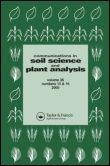
COMMUNICATIONS IN SOIL SCIENCE AND PLANT ANALYSIS
Scope & Guideline
Nurturing Research for a Greener Tomorrow
Introduction
Aims and Scopes
- Soil Health and Quality Assessment:
Research on the physical, chemical, and biological properties of soils, including how these properties affect soil health and agricultural productivity. - Nutrient Management and Fertilization Strategies:
Studies focusing on optimal nutrient management practices, including the use of organic, inorganic, and biofertilizers to enhance crop yields and soil fertility. - Impact of Soil Amendments and Organic Matter:
Exploration of the effects of various soil amendments, such as compost, biochar, and organic matter, on soil properties and crop performance. - Water Management and Irrigation Practices:
Research on efficient water use in agriculture, including irrigation techniques and their effects on soil moisture and crop productivity. - Soil and Plant Interactions:
Investigations into the relationships between soil characteristics and plant growth, including nutrient uptake, stress responses, and soil microbial activity. - Sustainable Agricultural Practices:
Focus on sustainable practices that promote environmental health, including conservation agriculture, integrated nutrient management, and organic farming. - Technological Innovations in Soil Science:
Studies employing advanced technologies such as remote sensing, machine learning, and modeling to analyze soil properties and predict agricultural outcomes.
Trending and Emerging
- Biostimulants and Biofertilizers:
There is a growing trend in research exploring the use of biostimulants and biofertilizers to enhance plant growth and soil fertility, indicating a shift towards more sustainable agricultural practices. - Precision Agriculture Technologies:
Emerging interest in precision agriculture, including soil sensors, data analytics, and IoT applications, is on the rise, reflecting advancements in technology that optimize resource use. - Climate Resilience and Stress Management:
Research focused on enhancing crop resilience to climate stressors, such as drought and salinity, is increasingly prominent, addressing urgent challenges in food security. - Soil Microbial Ecology:
Studies examining the role of soil microorganisms in nutrient cycling, soil health, and plant interactions are gaining traction, highlighting the importance of soil biology in sustainable agriculture. - Integrated Nutrient Management Systems:
There is a notable increase in research on integrated nutrient management systems that combine organic and inorganic practices to optimize soil fertility and crop productivity. - Carbon Sequestration and Soil Organic Matter:
Research on carbon sequestration practices and the dynamics of soil organic matter is trending, reflecting global priorities on climate change mitigation and sustainable land management.
Declining or Waning
- Traditional Chemical Fertilizers:
There appears to be a waning interest in studies solely focused on traditional chemical fertilizers, as the shift towards sustainable and organic practices gains momentum. - Conventional Tillage Practices:
Research on conventional tillage methods is becoming less prominent as conservation tillage and no-till practices are increasingly recognized for their benefits to soil health and sustainability. - Single Crop Systems:
There is a noticeable decline in studies exclusively examining single crop systems, as more research is directed towards intercropping and crop rotation practices that enhance biodiversity and resource use efficiency. - Pesticide Application Studies:
Research focused solely on pesticide applications is decreasing, likely due to growing concerns over environmental impacts and a shift towards integrated pest management strategies. - Soil Contamination Studies:
While still important, studies centered on soil contamination and remediation are less frequent, possibly overshadowed by more proactive approaches to soil health and sustainability.
Similar Journals
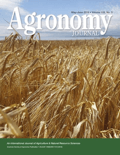
AGRONOMY JOURNAL
Elevating Agronomy: Where Science Meets SustainabilityThe Agronomy Journal, published by Wiley, is a leading platform for cutting-edge research in the field of agronomy and crop science. Established in the United States, this prestigious journal carries the ISSN 0002-1962 and E-ISSN 1435-0645, with its coverage spanning from 1976 to 2024, showcasing a wealth of knowledge over decades. The journal is recognized in the top quartile (Q1) of its category, making it a highly respected source for quality literature, ranking #108 out of 406 in the Scopus database and reflecting a 73rd percentile standing in agricultural and biological sciences. While it operates under traditional access options, its commitment to disseminating valuable scientific inquiry aligns with the objectives of advancing sustainable agricultural practices globally. The Agronomy Journal serves as an indispensable resource for researchers, professionals, and students eager to stay abreast of significant advancements and discussions influencing the future of crop science and agronomic research.
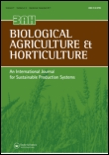
BIOLOGICAL AGRICULTURE & HORTICULTURE
Nurturing knowledge for a greener tomorrow.Biological Agriculture & Horticulture, published by Taylor & Francis Ltd, stands as a pivotal journal in the realms of agronomy and horticultural sciences. With an ISSN of 0144-8765 and an E-ISSN of 2165-0616, this esteemed journal has been disseminating vital research since its inception in 1982 and continues to publish leading studies through 2024. It currently boasts a commendable Q2 quartile ranking in both Agronomy and Crop Science as well as Horticulture, placing it in a prominent position within the academic community. With Scopus rankings indicating a 70th percentile in Horticulture and a 62nd percentile in Agronomy and Crop Science, the journal is a key resource for researchers, professionals, and students focused on innovative practices and scientific advancements in biological agriculture. While the journal is not open access, it remains an invaluable repository for cutting-edge research, methodologies, and reviews that push the boundaries of agricultural and horticultural sciences.

AGROCHIMICA
Fostering innovation in agronomy and food systems.AGROCHIMICA is an eminent journal published by PISA UNIV PRESS, dedicated to advancing the fields of Agronomy, Crop Science, Food Science, and Soil Science. With a rich history dating back to its inception in 1973, this journal has evolved through various phases of publication, illustrating its commitment to delivering quality research over several decades. Although currently categorized in the Q4 quartile across its respective disciplines, AGROCHIMICA provides a platform for foundational and innovative studies that contribute to knowledge in agricultural practices and sustainable food systems. While the journal is not open access, it remains a valuable resource for researchers, professionals, and students interested in Italy's and the global agricultural landscape, fostering a greater understanding of the complexities within these interconnected fields. The ISSN associated with this journal is 0002-1857, and it is published from Pisa, Italy, addressing the evolving challenges in agriculture with a spotlight on rigorous scientific inquiry.

PLANT SOIL AND ENVIRONMENT
Cultivating Knowledge for a Healthier Planet.PLANT SOIL AND ENVIRONMENT is a premier open-access journal dedicated to the interdisciplinary study of soil science, agronomy, and environmental interactions, published by the Czech Academy Agricultural Sciences. With an ISSN of 1214-1178 and E-ISSN 1805-9368, this journal has been a vital platform for dissemination of research since its inception in 2002. Based in the Czech Republic, it has garnered a robust reputation within its field, as indicated by its impressive Q2 ranking in Soil Science and ranking #47 out of 159 in the Scopus Ranks for Agricultural and Biological Sciences, placing it in the 70th percentile overall. The journal explores diverse topics within soils and their significant roles in plant health, ecosystem services, and sustainable agricultural practices, contributing important insights that benefit researchers, practitioners, and policy-makers alike. Aiming for a global outreach, PLANT SOIL AND ENVIRONMENT not only facilitates open dialogue among scientists but also ensures that cutting-edge research is freely accessible to enhance the knowledge base in soil science.

Journal of Soil Science and Plant Nutrition
Bridging the gap between soil health and crop productivity.The Journal of Soil Science and Plant Nutrition, published by SPRINGER INT PUBL AG, is a premier academic journal dedicated to advancing the fields of agronomy, plant science, and soil science. With an impressive Q1 ranking in both Agronomy and Crop Science and Plant Science, alongside a Q2 ranking in Soil Science, this journal stands at the forefront of innovative research and knowledge dissemination. Annually indexed in key databases, it provides a platform for high-quality research articles that explore the complex interactions between soil health and plant nutrition, contributing significantly to sustainable agricultural practices. Although it does not offer open access options, the journal is accessible through various academic institutions and libraries, ensuring a wide readership. With its emphasis on impactful findings, the journal is an essential resource for researchers, professionals, and students aiming to further their understanding and application of soil and plant science in an ever-evolving global context.

Agronomy-Basel
Empowering Innovation in Agronomy and Crop ScienceAgronomy-Basel is a leading international journal dedicated to advancing the field of agronomy and crop science, published by the respected MDPI. Since its inception in 2011, this open-access journal has provided a vital platform for the dissemination of high-quality research, featuring innovative studies and reviews that contribute to the understanding of agricultural practices and crop management. With an impressive impact factor and ranked in the Q1 quartile of its category for 2023, Agronomy-Basel has established itself as a premier resource in the realm of Agricultural and Biological Sciences, achieving a commendable rank of #62 out of 406 in its field, placing it in the 84th percentile. The journal targets researchers, professionals, and students who are dedicated to enhancing agricultural sustainability and productivity. Located in Basel, Switzerland, the journal's commitment to open access empowers global accessibility to flourishing agricultural advancements, thus fostering collaboration and innovation across the globe.

INDIAN JOURNAL OF AGRICULTURAL SCIENCES
Nurturing insights for a greener tomorrow.Welcome to the Indian Journal of Agricultural Sciences, a vital resource for researchers and professionals in the field of agricultural sciences, published by the esteemed Indian Council of Agricultural Research. Established in 1974, this journal aims to disseminate high-quality research and developments in agronomy and crop science, facilitating knowledge exchange and advancement within the agricultural community. Though currently classified in the Q4 category according to 2023 data, it provides an essential platform for publication, contributing valuable insights towards sustainable agricultural practices. With an ISSN of 0019-5022 and an E-ISSN of 2394-3319, the journal houses important research that spans decades of convergence and collaboration, promoting innovation in agriculture across India and beyond. As an open access platform, it invites contributions that reflect a wide array of agricultural disciplines to foster sustainable food systems that address the challenges of food security. Join the network of scholars and practitioners by sharing your research and engaging with the profound work being done in this transformative field.
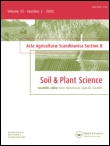
ACTA AGRICULTURAE SCANDINAVICA SECTION B-SOIL AND PLANT SCIENCE
Bridging Science and Practice in Agronomy and Soil ScienceACTA AGRICULTURAE SCANDINAVICA SECTION B-SOIL AND PLANT SCIENCE, published by Taylor & Francis AS, is a distinguished journal dedicated to the fields of Agronomy, Crop Science, and Soil Science. With an impressive impact factor, and categorized in Q2 for both Agronomy and Crop Science and Soil Science as of 2023, this journal is an essential resource for researchers, professionals, and students aiming to advance their understanding of soil-plant interactions and sustainable agricultural practices. Operating since 1992 and continuing through to 2024, ACTA aims to publish high-quality, peer-reviewed research that encourages the applicability of advanced scientific knowledge in real-world agricultural settings. While the journal is not open access, it remains widely accessible through institutional subscriptions, reflecting its commitment to disseminating essential findings and fostering innovation in soil and plant science worldwide. Nestled in the vibrant academic environment of Norway, ACTA AGRICULTURAE SCANDINAVICA serves as a key platform for nurturing groundbreaking research that informs sustainable agricultural policies and practices globally.
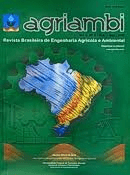
Revista Brasileira de Engenharia Agricola e Ambiental
Connecting Researchers for a Sustainable Future in AgricultureRevista Brasileira de Engenharia Agricola e Ambiental, published by the Universidade Federal de Campina Grande, serves as a pivotal platform for researchers and professionals in the fields of agricultural and biological sciences, agronomy, and environmental engineering. With an open-access policy since 2000, this journal aims to foster global dissemination of innovative research and practices, ensuring that high-quality findings are accessible to all. Operating in Brazil, it holds notable rankings, including Q2 in the categories of Agricultural and Biological Sciences (miscellaneous) and Agronomy and Crop Science, indicating its strong academic impact and influence within these fields. As of 2023, it ranks #68 out of 193 in Agricultural and Biological Sciences and #188 out of 406 in Agronomy and Crop Science, representing its commitment to advancing scientific knowledge. The journal primarily focuses on publishing studies that address challenges in agricultural engineering and environmental sustainability, making it an essential read for students, researchers, and professionals who are dedicated to innovation and excellence in these dynamic fields.

Zemdirbyste-Agriculture
Harvesting insights for a resilient agricultural landscape.Zemdirbyste-Agriculture is a prominent journal dedicated to advancing the field of agricultural sciences, with a particular focus on agronomy and crop science. Published by the Lithuanian Research Centre Agriculture & Forestry, this open access journal has been fostering knowledge sharing and scientific discourse since 2004, allowing researchers, professionals, and students unrestricted access to its content. Located in the beautiful country of Lithuania, specifically at Vytautas Magnus University, this journal plays a significant role in disseminating innovative research findings. With a 2023 Scopus ranking of #246 out of 406 in the category of Agricultural and Biological Sciences, Zemdirbyste-Agriculture falls within the Q3 quartile, reflecting its growing influence in the academic community. This journal, which has converged its publication focus from 2008 to 2023, aims to provide a platform for scientists to share their critical insights on agricultural practices, sustainability, and technological advancements in crop science, thereby contributing to the global discourse on food security and environmental health.